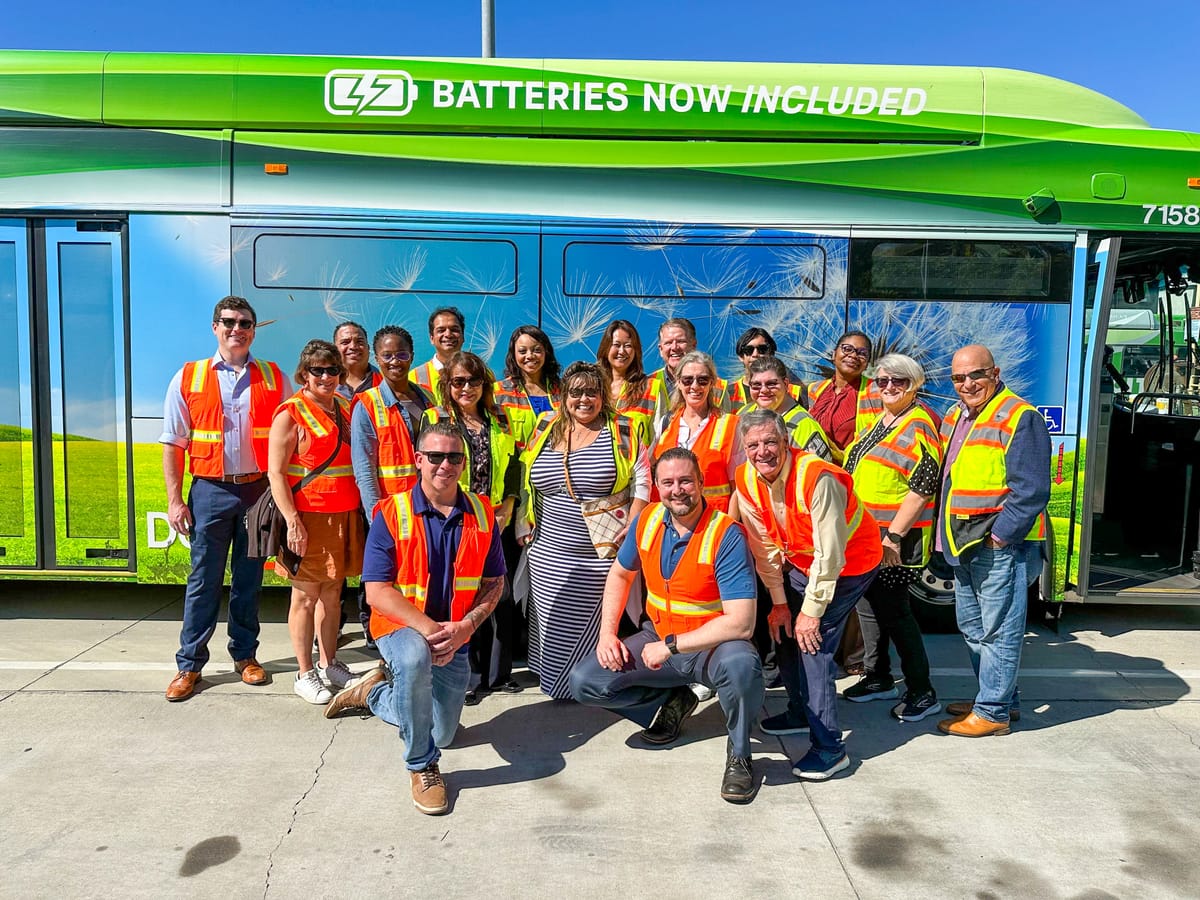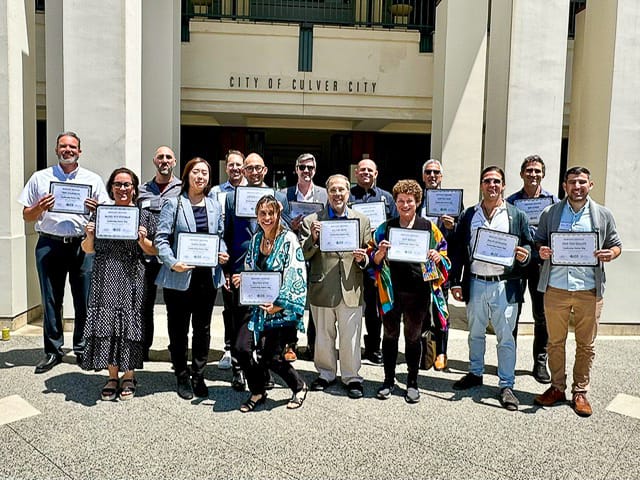Former Mayor keeps citizens engaged with Leadership Culver City
Jim Clarke saw a need for more civic engagement from its residents and decided to take action.

As a Culver City council member, Jim Clarke saw the importance of participating in shaping the city one lives in.
The former mayor saw a need for more civic engagement from its residents and decided to take action. His ongoing answer to that need is Leadership Culver City, a program that gives Culver City residents the tools they need to meaningfully engage in civic duties like boards and commissions.
"The main obstacle for people to become involved was just a lack of familiarity with how and feeling like they didn't understand the issues," Clarke, who serves as Leadership Culver City's Program Director, told Culver Crescent.
Clarke had great support from the community when he got Leadership Culver City started in 2018. Dr. James Limbaugh at West Los Angeles College wanted to make the college a more active participant in Culver City life, and John Cohn with the Culver City Exchange Club saw membership numbers decreasing and wanted to get residents more involved in service.
"It was founded as a result of a meeting of a few of us who were all interested in the issue of civic engagement," Clarke said.
Leadership Culver City was initially designed as a nine-month program, but for the first time this year, it has been shortened to six months to make it easier for participants to attend the entire program. It runs from January to June 2025, with sessions lasting from 9 a.m. to 4:30 p.m. — an hour longer than previous cohorts — held at various locations on the third Friday of each month.
The requirements to participate are simple: one must be a Culver City resident over 18. Applications are reviewed by a Leadership Culver City Steering Committee that includes Clarke and one member each from the city, the Exchange Club, West Los Angeles College, the Chamber of Commerce — which was also a key founding partner — the Culver City Rotary Club, and the Center for Nonprofit Management.
Leadership Culver City has yet to reject an applicant, having participants as young as 20 and as old as 80.
The program covers topics such as transportation and mobility, business and economic development, arts and culture, and housing and homelessness. The location of each session changes to fit the topic covered that day, and Leadership Culver City engages participants with key figures in those fields.
"The first topic we usually have is local government and public services," Clarke said. "The Mayor will come in and talk about the vision for where the city is headed."
In addition to the subject training, instruction on more general leadership and communication topics from the Center for Nonprofit Management is also a critical part of Leadership Culver City's curriculum. The program's shortening has resulted in the individual sessions being lengthened, and half of each session is dedicated to this training.
Having interactive exercises is key for Clarke and Leadership Culver City. He ensures that the curriculum is taught through more than just a lecture, whether it is the leadership training or working with volunteer speakers in different fields.
"It's not just 'sit there and the speakers come in and talk,'" Clarke said. "We want to have a dialog or discussion; we want you to be prepared to ask tough questions of the speaker so you can really learn about the issues."
Additionally, Clarke assigns short readings before each session to add the needed context related to Culver City for each issue. While he doesn't consider it homework, Clarke feels these readings are necessary to frame each topic through the Culver City lens.
"If you are talking about transportation or mobility," Clarke said, "you better understand what the Move Culver City project has been all about."
To complete the program, participants must display the results of their training in the form of group projects that benefit the community. Prior to the main program, participants go through an orientation meeting, during which Clarke gives an evaluation to determine each person's leadership and management style.
Based on the results of those evaluations, the cohort is split into groups of four or five by the first or second session, and each group is required to complete a project together by the end of the program.
"If it involves raising some money, participants have to figure that out," Clarke said. "They put it together."
Leadership Culver City participants have produced projects such as clothing drives, council candidate forums, and the creation of a refrigerator magnet displaying important city phone numbers. While these projects are generally required to be completed by the end of the program, Clarke has allowed projects like the candidate forum to extend beyond the end of the cohort for logistical reasons.
At the very end of the program, Leadership Culver City holds a graduation ceremony for each cohort. Participants are also required to give a three-minute speech on what they learned.
"They make what I would call a personal statement of civic engagement," Clarke said. "You learn how to get your point across and do it in a concise manner."

Graduates also receive a commemorative certificate and a lunch, with last year featuring Rutt's Hawaiian Barbeque. This session's graduation date has yet to be nailed down, but it will occur after the June session and before the Fourth of July.
While it started with Clarke's support as mayor, Leadership Culver City has since become its own entity spearheaded by Clarke after his time on the council. Because of this, Leadership Culver City is primarily funded through the tuition paid by those participating.
The tuition for each participant is $900, covering an approximately $20,000 budget. Some of that money goes to providing lunch for participants and a small stipend for Clarke as the program director, but he says that the training with the Center for Nonprofit Management and paying for a fiscal intermediary make up a large chunk of the expenses.
Leadership Culver City has some money from the Exchange Club to provide $300 scholarships to some applicants. Still, they rely on hitting a certain number of participants to be self-sustaining.
"We would like to have a minimum of 16 people, and we are very close to 16," Clarke said. "With 16 people, we can pretty much have the program pay for itself."'
Clarke has had to extend the application deadline several times to try to attract the final participants he needs to maintain the program's self-sufficiency. The current deadline is this Friday, December 13.
"I extended the deadline by two weeks, and I think I got at least half of the people that have applied come in after the original deadline," Clarke said.
The program's results are clear. Councilmember Freddy Puza and Ethics and Human Relations Advisory Committee Vice Chair Denice Renteria were among the graduates of the four previous cohorts, two of which were canceled due to COVID-19, and they each gave positive testimonials to Leadership Culver City.
Clarke told a story about a former participant who even left his ministry because his perspective changed so much after attending Leadership Culver City. He says he has not heard anything negative about the program, and the knowledge of Culver City and its "movers and shakers," as Clarke calls them, is an essential benefit people take from Leadership Culver City.
"It's just a matter of getting people to submit the application," Clarke said. "Once they are in the program, they feel it is really great."
To apply, visit the Leadership Culver City website here.




Comments ()